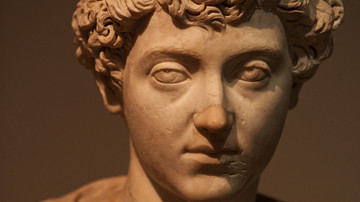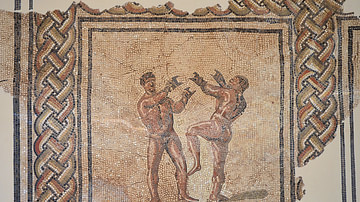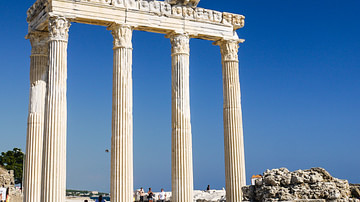Search
Search Results

Article
A Roman Boy's Rite of Passage
A Roman boy's rite of passage, a ceremony or ritual marking a transitional period in life from childhood to adulthood, was the assuming of the toga virilis, the adult toga. The ceremony usually took place sometime between the boy's 14th and...

Article
The Year of the Four Emperors & the Demise of Four Roman Legions
During the Year of the Four Emperors (69 CE), the fight between Vitellius and Vespasian would ultimately bring about the demise of four legions, the XV Primigenia, I Germanica, IIII Macedonica, and XVI Gallia. All four of these legions had...

Article
Battle of Telamon
Ever since the 4th century BCE, the Gallic tribes of northern Italy clashed with the expanding Roman Republic. In 225 BCE, the Boii forged alliances with fellow Gallic tribes of northern Italy and with tribes from across the Alps. The pan-Gallic...

Article
Boxing in the Roman Empire
Boxing is one of the oldest sports in the world that is still practiced today. Included in the original athletic contests of the Olympic Games, pugilism or boxing was well known and loved by the ancient Greeks and Romans. The style used in...

Article
Roman Girls and Marriage in Ancient Rome
In ancient Rome, the legally acceptable age for marriage for girls was twelve. Although in middle-class Roman society, the most common age of first marriage for a girl was mid-to-late teens, evidence also shows that in a section of elite...

Definition
Roman Forum
The Roman Forum or Forum Romanum of ancient Rome was the bustling religious, administrative, legal, and commercial heart of the city from the 7th century BCE onwards. Made increasingly grandiose and ceremonial in function by the Imperial...

Lesson Pack
Roman Warfare & Battles
We have prepared five lesson plans including classroom activities, assignments, homework, and keys as well as: - Multiple choice quiz questions in an excel format - Glossary of keywords and concepts in an excel format - Open questions...

Definition
Side
Side (pronounced see-day) was a city on the southern coast of Cilicia (modern-day Turkey) first settled in the 7th century BCE by immigrants from Cyme, an Aeolian municipality to the north near the kingdom of Lydia. Its name means 'pomegranate'...

Article
Slavery in the Roman World
Slavery was an ever-present feature of the Roman world. Slaves served in households, agriculture, mines, the military, workshops, construction and many services. As many as 1 in 3 of the population in Italy or 1 in 5 across the empire were...

Article
Ancient Roman Society
Rome began as a small city on the banks of the Tiber River in Italy. The Latin tribes (also known as the Latini or Latians) inhabited the region c. 1000 BCE but the founding of the city is dated to 753 BCE. The family was the center and foundation...